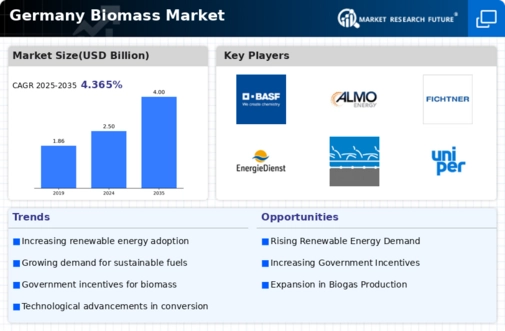The biomass market in Germany is characterized by a dynamic competitive landscape, driven by increasing demand for renewable energy sources and stringent environmental regulations. Key players such as Uniper SE (DE), RWE AG (DE), and Vattenfall GmbH (DE) are actively positioning themselves to capitalize on these trends. Uniper SE (DE) has focused on enhancing its biomass portfolio through strategic partnerships and investments in innovative technologies, while RWE AG (DE) has been expanding its operational capacity in biomass energy production, indicating a robust commitment to sustainability. Vattenfall GmbH (DE) appears to be leveraging digital transformation initiatives to optimize its biomass operations, thereby enhancing efficiency and reducing costs. Collectively, these strategies contribute to a competitive environment that emphasizes innovation and sustainability.
In terms of business tactics, companies are increasingly localizing manufacturing and optimizing supply chains to enhance operational efficiency. The market structure is moderately fragmented, with several players vying for market share. However, the collective influence of major companies like E.ON SE (DE) and Enertrag AG (DE) is notable, as they continue to shape market dynamics through strategic investments and collaborations. This competitive structure fosters an environment where innovation and operational excellence are paramount.
In November 2025, E.ON SE (DE) announced a significant investment in a new biomass facility in North Rhine-Westphalia, aimed at increasing its renewable energy output by 20%. This strategic move not only aligns with Germany's energy transition goals but also positions E.ON as a leader in the biomass sector. The facility is expected to utilize advanced technologies to enhance energy efficiency, thereby reducing carbon emissions and supporting the company's sustainability objectives.
In October 2025, RWE AG (DE) entered into a partnership with a leading technology firm to develop AI-driven solutions for optimizing biomass feedstock management. This collaboration is poised to enhance RWE's operational efficiency and reduce costs associated with biomass procurement. By integrating AI into its operations, RWE is likely to improve its competitive edge in the market, as it can respond more effectively to fluctuations in feedstock availability and pricing.
In September 2025, Vattenfall GmbH (DE) launched a pilot project focused on the integration of digital technologies in biomass energy production. This initiative aims to streamline operations and improve data analytics capabilities, which could lead to enhanced decision-making processes. The pilot project reflects Vattenfall's commitment to innovation and positions the company to better adapt to the evolving energy landscape.
As of December 2025, current competitive trends in the biomass market are increasingly defined by digitalization, sustainability, and the integration of advanced technologies. Strategic alliances among key players are shaping the landscape, fostering collaboration that enhances innovation and operational efficiency. Looking ahead, competitive differentiation is expected to evolve, with a shift from price-based competition to a focus on technological innovation and supply chain reliability. This transition underscores the importance of adaptability and forward-thinking strategies in maintaining a competitive advantage in the biomass market.





















Leave a Comment